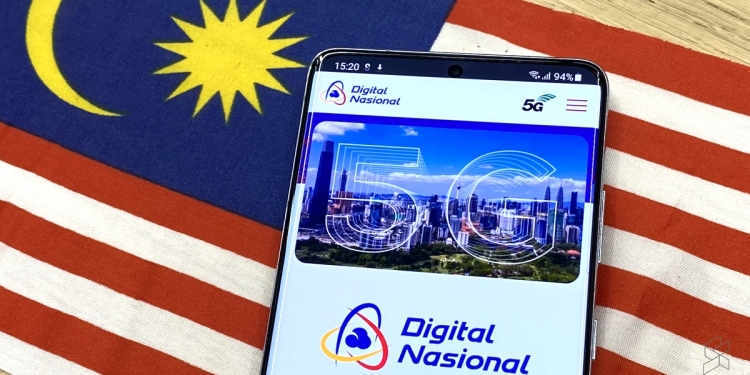During today’s joint press conference by the Communications and Multimedia Ministry and the Finance Ministry, it has been decided that the Malaysian government will proceed to roll out 5G via Digital Nasional Berhad (DNB) on a Single Wholesale Network (SWN) model. This puts an end to the debate of whether Malaysia should consider a Dual Wholesale Network (DWN) model which would allow private telcos to form a consortium to develop another 5G network to compete with DNB.
The government has also announced that it will reduce its stake in DNB and offer a 70% stake to private telcos that are committed to signing a wholesale access agreement. With the new proposed structure, the government will reduce their equity in DNB from 100% to 30%. Details of ownership and equity valuation are subject to discussions between DNB and the telcos, where an agreement is expected to be finalised soon.
📌 Kerajaan putuskan pelaksanaan rangkaian 5G secara Rangkaian Borong Tunggal (SWN) dikekalkan
— BERNAMA (@bernamadotcom) March 16, 2022
📌 Kerajaan kekal pegang 30% pegangan ekuiti dalam Digital Nasional Bhd (DNB), tawar sehingga 70% yang selebihnya kepada syarikat telekomunikasi
– Menteri Kewangan @tzafrul_aziz pic.twitter.com/xPArmJLTmy
They added that DNB will be regulated by the Communications and Multimedia Ministry via the Malaysian Communications and Multimedia Commission (MCMC). Meanwhile, the Ministry of Finance will continue to monitor DNB from the administrative and shareholding aspect.
According to Finance Minister Tengku Zafrul Abdul Aziz, the decision to retain the SWN model instead of proceeding with a DWN is the government’s firm stance on ensuring policy continuity in the country. It also represents a strong public-private partnership model as well as an established private sector financing ecosystem which will help to boost investor confidence in Malaysia. The government said that DNB is expected to maintain its current promised wholesale 5G data pricing of less than 20 sen per GB.
Model SWN dikekalkan demi memastikan perkhidmatan 5G yang lebih murah untuk rakyat. Selain daripada mengubah struktur pemilikan saham DNB kepada syarikat-syarikat telekomunikasi, kerajaan juga memutuskan untuk meletakkan DNB di bawah kawal-selia KKMM. pic.twitter.com/5uDUrtPkhV
— Annuar Musa (@AnnuarMusa) March 16, 2022
Meanwhile, Communications and Multimedia Minister Annuar Musa said Malaysians deserve to enjoy high-quality and equal access to 5G at an affordable price to help speed up economic recovery after the pandemic. He said the SWN model will help to bridge the digital divide in rural areas and to ensure all Malaysians can enjoy a high-quality and wide 5G service from the telcos.
The statement added that the retention of the SWN model will allow continuity of the existing plan, equipment procurement, and appointments of local companies involved in the development of 5G. Under Phase 1 of the 5G rollout, DNB aims to achieve 40% 5G population coverage by the end of 2022 and 80% 5G population coverage by the end of 2024. As teased recently, DNB is currently rolling out 5G in Johor Bahru and they have marked Selangor, Penang and Perak as their upcoming locations.
The MCMC has allocated 700MHz, 3500MHz and 28GHz spectrum exclusively to DNB. In July last year, the regulator has removed technology neutrality for existing spectrum in a bid to prevent telcos from rolling out 5G services with the current 2300MHz and 2600MHz bands. Annuar Musa shared in Parliament last year that technically, telcos are able to use their current 4G spectrum for 5G but if they are allowed to do so, it will affect the SWN model by DNB.
Will telcos take the 70% stake?
At the moment, YTL Communication’s Yes is the first and only telco to offer 5G services using DNB’s network. Telekom Malaysia (TM) has also signed to participate in DNB’s 5G user trial but they have yet to introduce their 5G offering to consumers.
Since the launching of their network in December 2021, DNB has failed to convince the big four telcos such as Celcom, Digi, Maxis and U Mobile to use their 5G network. Instead, the big four have publicly proposed to the government to allow them to form a consortium to build a second 5G network. Through the consortium, the telcos aim to achieve a faster rollout of 5G across Malaysia than any one party.
In the past few years, the big four telcos have already made significant network investments in preparation for 5G. Since DNB has already signed contracts with various vendors including Ericsson, it isn’t clear if telcos would be enticed to take a stake in a network that’s already halfway deploying 5G.
The SWN model has been criticised as a risky approach and it could threaten Malaysia’s digital competitiveness. Last week, the South African government has scrapped its plans to launch a similar SWN in the hope to increase competition in the telco industry. They have started auctioning out their 4G and 5G spectrum which include the 700MHz and 3500MHz bands. South Africa’s proposed SWN was partly modelled after Mexico’s SWN called Red Compartida which was declared bankrupt.
The Mexico SWN had failed to deliver its targetted 4.5G rollout which aimed at covering 92.5% coverage by 2024. The Mexican regulator IFT, has recently granted Red Compartida a 4-year extension to achieve their rollout target by 2028.








